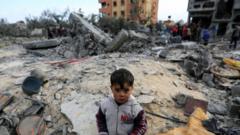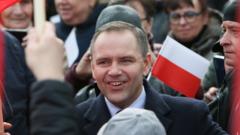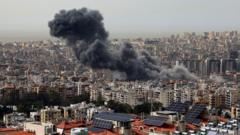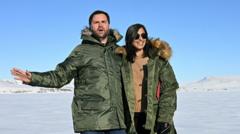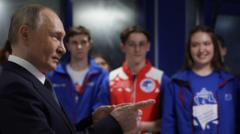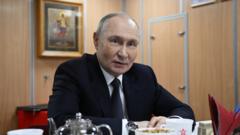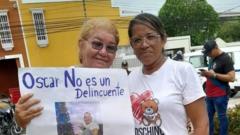Zelensky expresses concern over Russian narratives influencing US politics while seeking continued support.
Zelensky Calls for Strong US Support Against Russian Ceasefire Demands
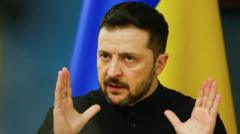
Zelensky Calls for Strong US Support Against Russian Ceasefire Demands
Ukrainian President emphasizes the importance of US resilience as Russia proposes lifting sanctions.
In a recent panel interview in Paris, Ukrainian President Volodymyr Zelensky conveyed his hope that the United States would maintain its strength and resolve when confronted with Russian demands concerning a ceasefire in the Black Sea. Russia's proposal stipulates that a maritime ceasefire—which would permit safe passage for commercial vessels—would only take effect if Western sanctions on Russian food and fertilizer trade are lifted.
Zelensky's comments aimed to underscore the critical role of US support as he responded to a question from a BBC journalist regarding the Biden administration's potential resistance to Russian negotiations. "I hope so. God bless, they will. But we'll see," he remarked, after expressing gratitude for the bipartisan backing from the US.
The premise for these discussions was established during three days of talks in Saudi Arabia, which led to both Russian and Ukrainian delegations agreeing to a ceasefire. However, the Kremlin quickly published a set of demands that included lifting sanctions on financial institutions connected to agricultural trade and reinstating their access to the Swift international payment network.
Former President Trump mentioned that the current US administration was reviewing Russia's request for sanctions relief, while the European Union has maintained that it would not contemplate sanction removals until there is an unconditional withdrawal of Russian troops from Ukraine.
During the Paris panel, Zelensky conveyed his apprehensions about the influence of Russian narratives within US political circles, stressing the importance of not yielding to those narratives. He refrained from making comments about his direct relationship with Trump or Putin when asked, stating, "I don't know - it's difficult for me to say."
Regarding remarks made by Trump envoy Steve Witkoff, who downplayed Europe's efforts to rally supportive coalitions for Ukraine, Zelensky evidenced his non-confrontational stance by noting that Witkoff's background in real estate did not translate to expertise in international relations. "As far as I know, he knows very well how to buy and sell real estate, but that's somewhat different," he said.
Zelensky's comments aimed to underscore the critical role of US support as he responded to a question from a BBC journalist regarding the Biden administration's potential resistance to Russian negotiations. "I hope so. God bless, they will. But we'll see," he remarked, after expressing gratitude for the bipartisan backing from the US.
The premise for these discussions was established during three days of talks in Saudi Arabia, which led to both Russian and Ukrainian delegations agreeing to a ceasefire. However, the Kremlin quickly published a set of demands that included lifting sanctions on financial institutions connected to agricultural trade and reinstating their access to the Swift international payment network.
Former President Trump mentioned that the current US administration was reviewing Russia's request for sanctions relief, while the European Union has maintained that it would not contemplate sanction removals until there is an unconditional withdrawal of Russian troops from Ukraine.
During the Paris panel, Zelensky conveyed his apprehensions about the influence of Russian narratives within US political circles, stressing the importance of not yielding to those narratives. He refrained from making comments about his direct relationship with Trump or Putin when asked, stating, "I don't know - it's difficult for me to say."
Regarding remarks made by Trump envoy Steve Witkoff, who downplayed Europe's efforts to rally supportive coalitions for Ukraine, Zelensky evidenced his non-confrontational stance by noting that Witkoff's background in real estate did not translate to expertise in international relations. "As far as I know, he knows very well how to buy and sell real estate, but that's somewhat different," he said.



